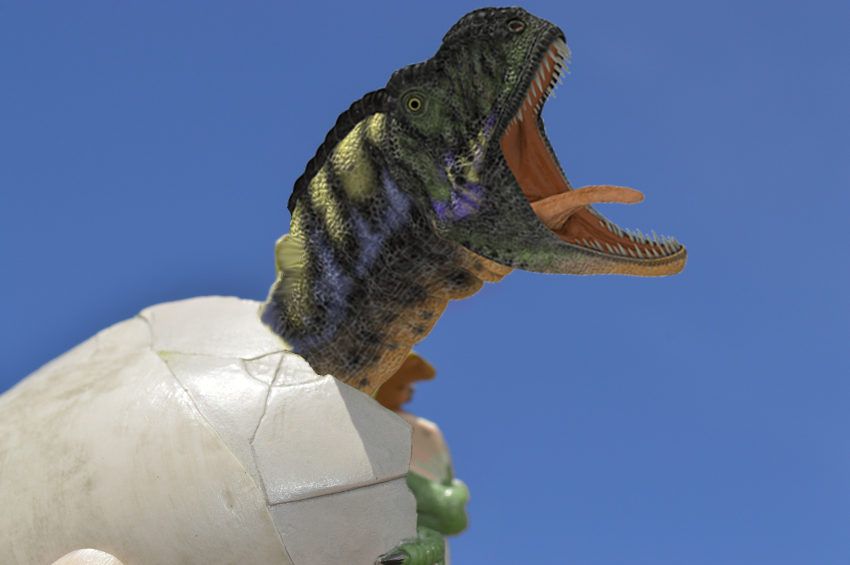
Pet Dinosaur Cost Considerations
I’m obsessed and intrgued by this whole Chickenosaurus project. While you can technically already have pet dinosaurs in the form of birds, it doesn’t quite evoke the same emotional response when you look at a parakeet, then look at a tyrannosaurus rex. With Dr. Horner’s reverse engineering project two-thirds complete, the return of a long-tailed, tooth-and-snout dinosaur is imminent. Dr. Horner has talked openly about everyday people keeping these as pets. After all, they are just genetically modified chickens. Worst case scenario, if it gets loose, it might be chasing the neighbor’s cat, but it won’t be chasing you. Considering the financial ramifications of a pet Chickenosaur might be premature, but it’s DINOSAURS so let’s do it.
Pet Dinosaur Price Tag
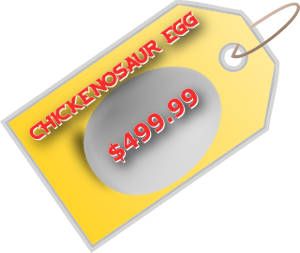 Starting with the base price of a chicken today is a reasonable starting point. Dr. Horner chose chickens for his project first because of how cheap they were, so that’s one factor in favor of the average person being able to afford one of these things. Ten chicken eggs cost from $15 to $35, depending on which sex you want at local agricultural supply store. Males are cheaper, probably because females are more useful for their eggs. (That’s a pretty cool prospect too – dinosaur eggs for breakfast?). We’ll just round it to $2.50 per egg for purposes of this wild, yet not completely off base, fantasy project.
Starting with the base price of a chicken today is a reasonable starting point. Dr. Horner chose chickens for his project first because of how cheap they were, so that’s one factor in favor of the average person being able to afford one of these things. Ten chicken eggs cost from $15 to $35, depending on which sex you want at local agricultural supply store. Males are cheaper, probably because females are more useful for their eggs. (That’s a pretty cool prospect too – dinosaur eggs for breakfast?). We’ll just round it to $2.50 per egg for purposes of this wild, yet not completely off base, fantasy project.
You might think the actual cost of a lab to genetically modify these embryos might be expensive – but you’d be wrong. According to an article on Business Insider, the whole lab setup would run you just $2000. A lot of money to be sure, but almost scary cheap when you start thinking of the powerful technology it takes to genetically alter something on this scale. Splitting $2000 between what I can only guess would be MILLIONS of wannabe-dinosaur-pet-owners, I imagine the cost would be driven down pretty low. Say $20? I’m guessing really, but it seems ballpark to me.
I couldn’t find any information on how long it might take to make the modifications, but I did find that molecular biologists make $58,000 per year or $27.89 per hour. Assuming you could create one embryo a day, that makes it $223.12 labor per embryo.
That puts us at $245.62 cost per baby dinosaur. I’d imagine no less than 100% markup for something so revolutionary, and a nice rounding out at $499.99 plus shipping. Maybe as much as $999.99 because let’s face it, people would still pay it. But that doesn’t cover all the costs of our pet chickenosaur yet. I didn’t factor in the $5,000,000 grant from George Lucas that is paying to do all of this research. That also assumes that it won’t take any more than what’s been donated already. Of course a grant comes free, so I really have no clue on how to add this to the equation.
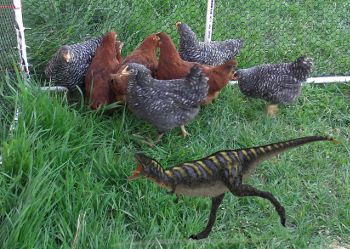 Chick-Err-Dino Coop
Chick-Err-Dino Coop
This is going to be a wild animal, not a domesticated pet like your cat or dog. You’ll probably need to keep it outside in something between a chicken coop and dog pen. A little research and I found that chickens need 4 square feet of space per chicken in the coop, and 9 square feet outdoors. I’d argue you’ll probably need a little more given that this creature is going to be something a little new, and a little different. About 15 square feet and a dino-doggie-house should do the trick. Store bought chicken coops start at $199.99, and a sufficient size dog pen (7x8x4) runs $349.99, so that gives you an idea of what you’d need for your new pet Chickenosaur.
Care And Feeding
Chickens are surprisingly easy to take care of, and hopefully too a genetically modified dinosaur counterpart. This could arguable be a very low maintenance pet, perfect for the busy dinosaur lover.
- As needed filling of food and water. More on food in a moment.
- Daily check for eggs, making sure the enclosure is intact and that your dino is still alive and kicking.
- Change ‘nesting’ material, and remove dino droppings.
- Bi-annually you’ll probably want a good cleaning and disinfecting of the nesting area.
The cleaning costs will be pretty negligible, and if it did lay eggs you could eat, costs would be easily offset by a free breakfast. As far as food costs, these are gonna be crazy cheap. Purina Chicken Chow runs $15.49 for 50 lbs. Considering your chickenosaur is gonna be putting away 1/4 lb of chicken chow per day, that bag will last you almost an entire month. Of course there’s premium chick-I mean, dino-chow available as well if you want a top shelf diet for your little friend.
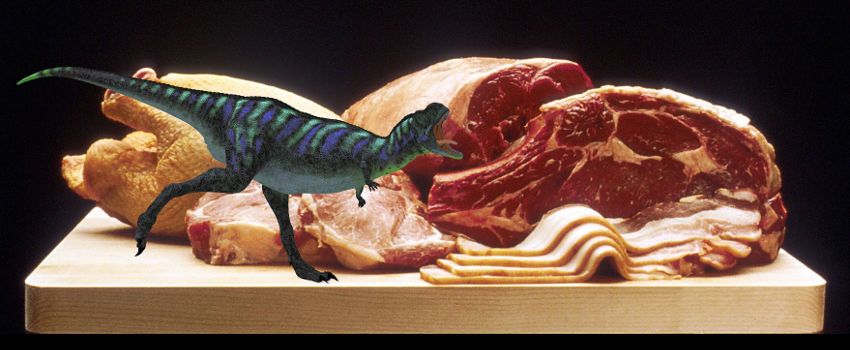
Fine Print Details
These little dinosaurs will probably weigh slightly more than the average chicken, given the addition of a tail as well as a snout and beak. This means it’d weigh in around 5-7 lbs. It’s also recommended that you get more than one chicken because they are social creatures, and don’t do well alone. At least you’ll get to make jokes about a herd of dinosaurs in your backyard. An 8 year lifespan is also something you’re looking at, although there’s no hard science yet on the long-term outlook for genetically modified creatures like this.
Future Considerations
So you’re looking at $1000 to $2000 to get set up with a baby dinosaur. At least, that’s my prediction. Once the secret to unlocking ‘dinosaur genes’ from chickens is unlocked, the sky’s the limit. Ostriches, eagles, and roadrunners are all fair game for more exotic, reverse engineered dinosaur pets. I’ve seen lots of exotic reptile pets for sale in pet stores from turtles to caiman alligators, so there’s no doubt that the demand will be insanely high. Of course the big question is, would you pay $1000 for a pet chickenosaur? $2000? I’m curious as to just how much people would legitimately pay for a pet dinosaur. And don’t say ‘any price’ because if that were true, everyone would have a Ferrari or Lamborghini to drive around.


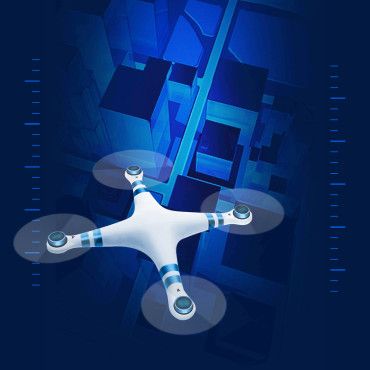

I have read everything I can find on this project. Who is behind it? I see the scientists name, but what company will be marketing the inevitable results? Who’s gonna sell the chickenosaurus?
Whoever patents the process first I imagine. Unless they make the research open source. Good question!
I’m wondering just how far we can take this thing. Like once we have an emusaurus, can we engineer it further or selectively breed it until we have something that looks like an allosaurus? I mean I know it won’t actually *be* an allosaurus. I just want a featherless non-avian dinosaur that’s taller than a human. Can we make that happen?
In theory, yes. Mr. Horner used the example of adding a horn to a horse to make it a unicorn. Limitless possibilities.
Checkout the comic tears of thunder on webtoon for a similar concept
When it was released and ready for his first step on earth after 65 million years
imagine that Mr beast got all the chickenosuras.
Il pay a good 500€ for a dinasaur thats a sise of a big chikken
I would too. I paid $1000 for a malinios puppy once. $700/500 Euros seems a good deal, though I hope it’ll be a lot cheaper.
I would too. I paid $1000 for a malinios puppy once. $700/500 Euros seems a good deal, though I hope it’ll be a lot cheaper.